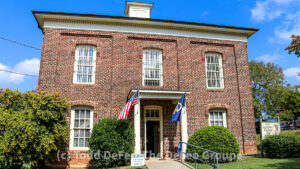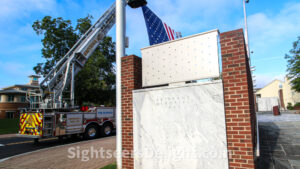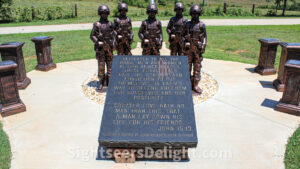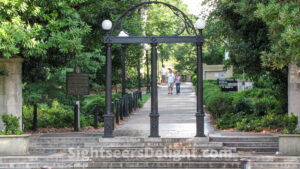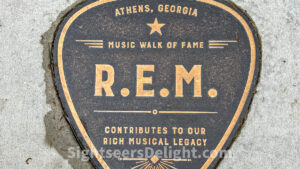Lumpkin County built its now historic jail in 1884. It features jail cells on the building’s second floor. The sheriff or a deputy lived on the ground floor. The National Register of Historic Places added the building to its list in 1985. Inside, visitors can glimpse the jail’s iron cell doors and scribbles inmates on the cell walls as they passed the time.
30533
The 20th Century Veterans Memorial in downtown Smyrna, Georgia, was dedicated on October 12, 2002. A Veterans Memorial Committee chose the site for the monument in August 1999, and it was expected to be finished by Labor Day 2001 at a cost of between $1 million and $1.5 million. In March 2000, the Smyrna City Council and the Smyrna Downtown Development Authority signed off on the plan despite opposition from nearby residents. However, work was delayed about a year, and officials broke ground on the project in January 2002. Then-Gov. Roy Barnes, U.S. Rep. Johnny Isakson and U.S. Sen. Max Cleland were among the dignitaries at the memorial’s dedication. A mix of private and state money funded the $650,000 memorial.
30080
54 Columns is a collection of 54 columns ranging from 10 to 20 feet tall. It was created in 1999 by Sol LeWitt, a minimalist artist. Known to some as Ghetto Stonehenge, the columns are supposed to resemble the Atlanta skyline. The art project was commissioned by the Fulton County Arts Council. In 2007, the Atlanta City Council designated the 210-acre Freedom Park, which is home to 54 Columns, as an Atlanta Public Art Project. LeWitt’s works can be seen in a number of museums nationwide, including the High Museum of Art in Atlanta. The Connecticut-born LeWitt died in 2007 at the age of 78.
30312
Just south of Adairsville, the raiders stopped to tear up the track, prohibiting their pursuers from continuing the chase in a locomotive. At this point, the pursuers abandoned their second locomotive — the William R. Smith — and continued on foot. Minutes later, they commandeered their third engine. They ran the Texas in reverse for the remainder of the chase. Today, a small museum located in the historic 1847 Western & Atlantic depot interprets the city’s role in the Great Locomotive Chase and features a number of exhibits related to the town’s history.
30103
The Flood Control Act of 1941 and the Flood Control Act 1944 authorized the construction Allatoona Dam, but World War II delayed the start of work. Construction began in 1946, and reservoir started to fill in during December 1949, eventually flooding the town of Allatoona. In January 1950, the dam and power station were operation in January 1950. Today, the U.S. Army Corps of Engineers owns and operates the dam.
30121
After Atlanta fell, Confederate Gen. John Bell Hood began marching toward Nashville, Tenn., hoping to break Sherman’s supply line. Hood attacked at Union troops positioned at a railroad pass southeast of Cartersville. The Battle of Allatoona Pass on Oct. 5, 1864, is among the Civil War’s bloodiest battles, and roughly 1,600 soldiers on both sides died. The railroad has been rerouted, but the battle site now sits on the edge of Lake Allatoona and is part of Red Top Mountain State Park.
30120
The city of Arcade, Georgia, dedicated its Veterans Memorial during the city’s centennial celebration on Aug. 17, 2009. It honors everyone who fought for the country, including those in “the Gulf wars,” the Athens Banner-Herald reported.
30549
The Arch was constructed in the 1850s as part of a larger iron fence protecting the university campus. It is generally regarded as the entrance to both the University of Georgia and the city of Athens. The Arch comprises three pillars representing Georgia’s state motto: “Wisdom, Justice, and Moderation.”
30602
The Athens Music Walk of Fame, unveiled in 2020 in downtown Athens, highlights the artists, organizations and locations that helped make the Classic City’s music scene legendary. The Walk of Fame is located downtown near some of Athens’ most famous music venues, including the Georgia Theatre and the 40 Watt Club. In 2020, the Athens Music Walk of Fame inducted ten people in downtown Athens, and the Athens Music Walk of Fame Committee selects five inductees each year. The Athens Music Walk of Fame Committee, appointed by the mayor, considers artists’ contributions, historical significance, career span, musical style, and diversity representation. Local designer Allen Sutton designed the plaque. The walk is funded by the Athens Cultural Affairs Commission and supported by the Athens Downtown Development Authority, Athens-Clarke County Leisure Services Arts Division, and Athens-Clarke County Transportation and Public Works Streets & Drainage Division.
30601
The Atlanta BeltLine is a 22-mile multi-use trail along a former railway corridor around the core of Atlanta. A Georgia Tech student proposed transforming the former rail corridor into a trail in a 1999 master’s degree thesis. The Atlanta BeltLine aims to reconnect neighborhoods and communities divided by infrastructure, improve transportation, add green space, promote redevelopment, create affordable housing, and showcase arts and culture. The BeltLine has opened in sections, including the Eastside, Westside and Northside trails.

